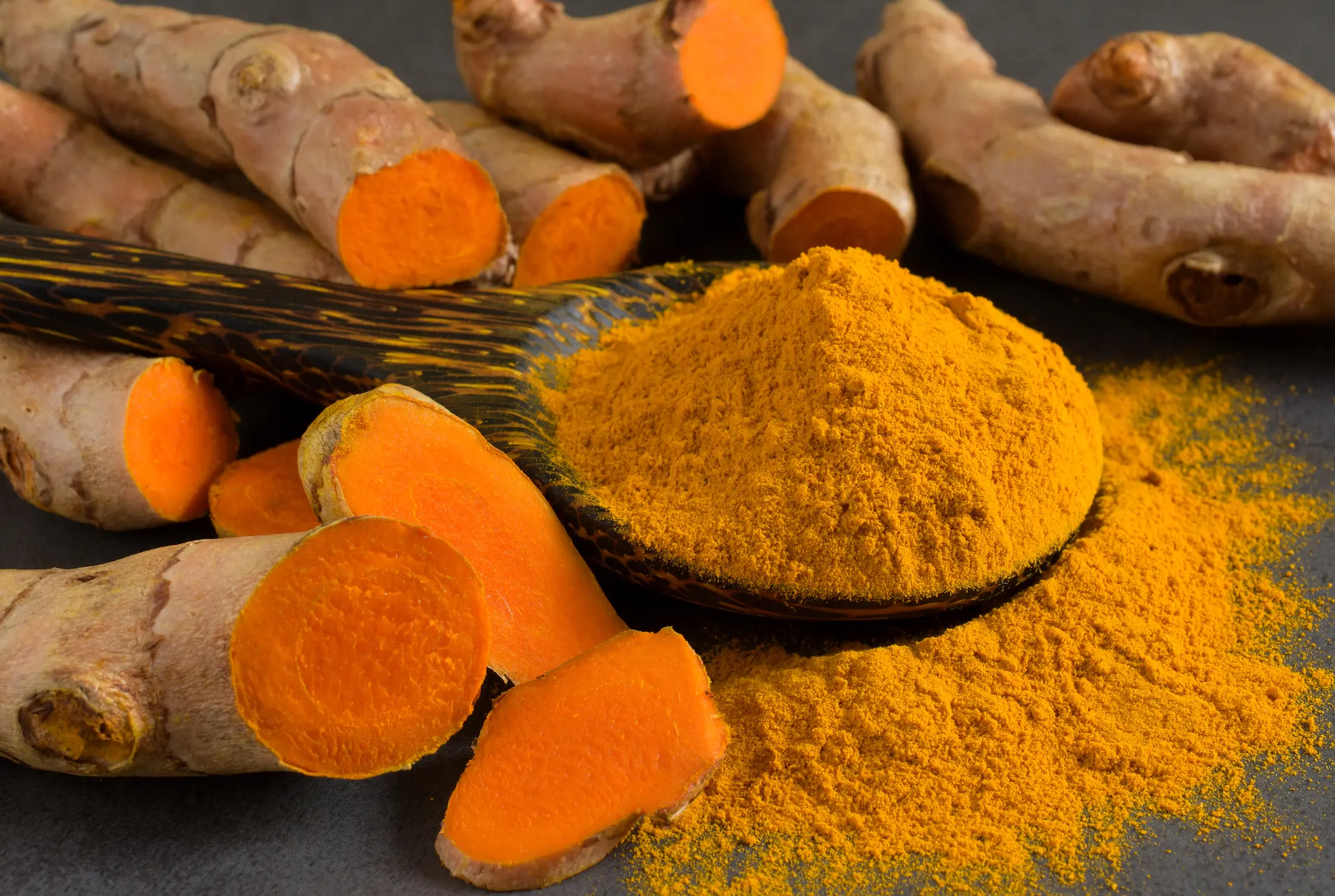Liposomal Curcumin – A Breakthrough in Curcumin Absorption and Efficacy

Abstract
Liposomal curcumin represents a groundbreaking advancement in curcumin supplementation, addressing the bioavailability limitations of traditional curcumin. Curcumin, a natural polyphenol extracted from Curcuma longa, is widely recognized for its anti-inflammatory, antioxidant, and therapeutic properties. However, its poor water solubility and rapid metabolism significantly reduce its absorption and bioavailability. Liposomal encapsulation overcomes these challenges by utilizing phospholipid vesicles that protect curcumin from digestive degradation and enhance its cellular uptake.
Scientific research demonstrates that liposomal curcumin (LC) outperforms conventional curcumin in clinical applications, including its ability to reduce inflammation, combat oxidative stress, and support immune health (Diomede et al. 2021). Studies have also highlighted its potential role in cancer therapy, where it exhibits pro-apoptotic effects on cancer cells and interacts with drug-metabolizing enzymes (Ermurat 2025). Additionally, its neuroprotective effects make it a promising supplement for cognitive function and neurodegenerative diseases.
This article explores the mechanisms, benefits, safety, and clinical applications of liposomal curcumin, providing a comprehensive guide on its efficacy compared to regular curcumin. Furthermore, it examines consumer reviews, supplement selection criteria, and scientific research, making it a valuable resource for individuals looking to optimize their health with liposomal curcumin (LC) supplementation.
What is Liposomal Curcumin?
Understanding Liposomal Encapsulation

Liposomal curcumin is an advanced formulation designed to enhance the bioavailability and therapeutic potential of curcumin, the active compound in turmeric (Curcuma longa). Due to its hydrophobic nature and rapid metabolism, traditional curcumin has poor absorption in the body, significantly limiting its effectiveness. Liposomal encapsulation addresses this issue by enclosing curcumin within liposomes—spherical vesicles composed of phospholipid bilayers that mimic cell membranes (Ermurat 2025).
Liposomes serve as protective carriers that shield curcumin from degradation in the digestive tract, increasing its absorption into the bloodstream (Diomede et al. 2021). This encapsulation technology helps curcumin bypass enzymatic breakdown in the liver and enhances its cellular uptake, leading to prolonged circulation and higher bioavailability compared to regular curcumin supplements. The phospholipid bilayers of liposomes also allow for better interaction with biological membranes, facilitating improved curcumin retention in target tissues (Ermurat 2025).
Furthermore, LC offers controlled and sustained release properties, ensuring that curcumin remains active in the body for extended periods. This controlled release mechanism is particularly beneficial in managing chronic inflammatory conditions and oxidative stress-related diseases (Diomede et al. 2021).
How Liposomal Curcumin is Made

The production of LC involves specialized nano-encapsulation techniques that ensure optimal particle size, stability, and bioactivity. One of the most commonly used methods is sonication, where high-frequency sound waves break down larger phospholipid molecules to form uniform, nano-sized liposomes (Ermurat 2025). This method enhances the encapsulation efficiency of curcumin and improves its dispersion in aqueous solutions.
Another advanced method used in LC production is controlled-release encapsulation, which allows for the gradual release of curcumin over time. This technique ensures a steady concentration of curcumin in the bloodstream, maximizing its therapeutic effects and minimizing rapid clearance from the body (Ermurat 2025).
Electron microscopy plays a crucial role in the structural and compositional analysis of LC formulations. Studies using scanning electron microscopy (SEM) and transmission electron microscopy (TEM) have confirmed the uniformity, stability, and integrity of LC nanoparticles (Ermurat 2025). These imaging techniques provide valuable insights into the morphology of liposomes, ensuring consistent quality in nutraceutical applications.
By leveraging these nanotechnology-driven manufacturing processes, liposomal curcumin achieves higher solubility, prolonged circulation time, and improved therapeutic outcomes, making it a promising alternative to traditional curcumin supplements.
Benefits of Liposomal Curcumin

Enhanced Bioavailability Compared to Regular Curcumin
Traditional curcumin has long been recognized for its powerful health benefits, but its clinical efficacy has been hindered by poor water solubility and rapid metabolism. When consumed in its natural form, curcumin is quickly broken down in the digestive system and has limited absorption into the bloodstream, which reduces its effectiveness (Diomede et al. 2021).
Liposomal curcumin overcomes these limitations by utilizing phospholipid vesicles that protect the compound from enzymatic degradation and improve its absorption. Studies have shown that encapsulating curcumin within liposomes significantly enhances its bioavailability, allowing for greater retention in the body and increased cellular uptake (Diomede et al. 2021). These improvements make liposomal curcumin a superior alternative for individuals seeking to maximize curcumin’s therapeutic benefits.
Anti-Inflammatory and Antioxidant Effects

Chronic inflammation and oxidative stress are linked to various health conditions, including cardiovascular disease, arthritis, and neurodegenerative disorders. Liposomal curcumin has demonstrated potent anti-inflammatory and antioxidant properties, making it a valuable natural remedy for these conditions (Diomede et al. 2021).
Research shows that liposomal curcumin can effectively reduce oxidative stress and inflammation in diseases such as periodontitis. The mechanism behind this involves the downregulation of key inflammatory pathways, including NF-κB, TLR4/MyD88, and the NLRP3 inflammasome (Diomede et al. 2021). By suppressing these pro-inflammatory signals, liposomal curcumin helps protect tissues from damage, alleviates pain, and supports overall immune function.
Potential Benefits in Cancer Therapy
The potential anticancer effects of curcumin have been extensively studied, and liposomal curcumin offers an even more effective approach for cancer treatment. Research indicates that liposomal curcumin nanoparticles exhibit pro-apoptotic effects, meaning they promote the programmed death of cancer cells, which is crucial in preventing tumor growth (Ermurat 2025).
Moreover, curcumin is known to inhibit drug-metabolizing enzymes such as CYP1A2 and CYP3A4, which can impact chemotherapy drug interactions (Ermurat 2025). This suggests that liposomal curcumin could serve as a supportive therapy in cancer treatment by enhancing the effectiveness of chemotherapy while also mitigating its side effects.
Cardiovascular and Metabolic Health
Inflammation plays a major role in the development of cardiovascular diseases, and liposomal curcumin has been shown to reduce inflammatory markers linked to heart disease (Diomede et al. 2021). By decreasing oxidative stress and suppressing inflammation, liposomal curcumin may help prevent conditions such as atherosclerosis, hypertension, and heart failure.
Additionally, liposomal curcumin has potential metabolic benefits, including regulating lipid metabolism and blood pressure. Some studies suggest that it may help lower LDL cholesterol levels and improve insulin sensitivity, making it a promising natural option for individuals with metabolic syndrome or diabetes.
Immunomodulatory and Antimicrobial Effects
The immune-modulating properties of liposomal curcumin make it beneficial for overall immune health. Research indicates that curcumin enhances the body’s ability to fight infections by regulating immune responses and reducing excessive inflammation (Ermurat 2025).
Furthermore, curcumin has antimicrobial properties, which may help combat bacterial, viral, and fungal infections. These properties are particularly beneficial for gut health, as curcumin may support a balanced microbiome and protect against harmful pathogens (Ermurat 2025). By strengthening immune defenses and promoting microbial balance, liposomal curcumin can be a valuable addition to a wellness regimen.
Scientific Research on Liposomal Curcumin

The Role of Liposomal Curcumin in Inflammatory Diseases
Inflammatory diseases are closely linked to oxidative stress and immune system dysregulation, making them key targets for anti-inflammatory interventions. Studies have shown that liposomal curcumin effectively reduces inflammation by mitigating oxidative damage and modulating key inflammatory pathways. One study examined its effects on lipopolysaccharide (LPS)-induced inflammation in endothelial cells and found a significant reduction in reactive oxygen species (ROS) production and pro-inflammatory cytokine levels (Diomede et al. 2021).
The underlying mechanism involves the downregulation of critical inflammatory mediators such as Toll-like receptor-4 (TLR4), Myeloid differentiation primary response 88 (MyD88), Nuclear factor-kappa B (NF-κB), and NLRP3 inflammasome (Diomede et al. 2021). These signaling pathways play crucial roles in triggering and sustaining inflammatory responses. By suppressing these pathways, liposomal curcumin helps reduce tissue damage, slow disease progression, and promote cellular homeostasis.
These findings suggest that liposomal curcumin could be particularly beneficial for conditions characterized by chronic inflammation, such as periodontitis, cardiovascular disease, and neurodegenerative disorders. Its enhanced bioavailability allows it to exert stronger and longer-lasting anti-inflammatory effects compared to traditional curcumin supplements.
Liposomal Curcumin and Nanotechnology
Advances in nanotechnology have played a critical role in improving the stability and bioactivity of curcumin. Research has shown that liposomal encapsulation significantly enhances the structural stability and efficacy of curcumin formulations. Scientists have used electron microscopy techniques, including scanning electron microscopy (SEM) and transmission electron microscopy (TEM), to analyze the microstructural and elemental composition of liposomal curcumin nanoparticles (Ermurat 2025).
These studies confirm that liposomal curcumin formulations maintain their integrity and exhibit high bioavailability and controlled release properties. Additionally, combining curcumin with other bioactive compounds, such as vitamin C, has been shown to enhance its therapeutic potential. Research on liposomal curcumin-vitamin C formulations has demonstrated improved cellular uptake and extended circulation time in the bloodstream (Ermurat 2025).
By utilizing nanotechnology, liposomal curcumin overcomes traditional barriers to absorption, ensuring that higher concentrations reach target tissues. This makes it a promising candidate for therapeutic applications in inflammatory diseases, cancer, and metabolic disorders.
Curcumin’s Role in Epigenetic Modifications

Beyond its direct anti-inflammatory effects, liposomal curcumin has been found to influence epigenetic mechanisms, which regulate gene expression. One key area of research focuses on how curcumin affects DNA methylation and histone acetylation, two processes that play a role in inflammation-related diseases (Diomede et al. 2021).
Studies indicate that liposomal curcumin can regulate DNA methyltransferase 1 (DNMT1), an enzyme responsible for maintaining DNA methylation patterns. In inflammatory conditions, DNMT1 levels are often dysregulated, leading to abnormal gene expression and increased production of pro-inflammatory cytokines (Diomede et al. 2021). Liposomal curcumin helps restore normal DNMT1 expression, thereby reducing excessive inflammation at the genetic level.
Similarly, curcumin modulates histone acetyltransferase p300, a protein that influences the activation of inflammatory genes. Overexpression of p300 is associated with increased NF-κB signaling, which drives chronic inflammation. Research has shown that curcumin reduces p300 activity, thereby suppressing inflammation at the epigenetic level (Diomede et al. 2021).
These findings highlight the potential of liposomal curcumin in treating chronic inflammatory diseases by targeting both molecular and epigenetic pathways. This dual mechanism of action makes it a powerful nutraceutical with broad therapeutic applications in autoimmune disorders, cancer, and metabolic diseases.
What is Liposomal Curcumin Used For?
Periodontal Disease and Oral Health
Liposomal curcumin has shown promising results in managing periodontal disease, a chronic inflammatory condition that affects the gums and supporting structures of the teeth. Periodontitis is caused by bacterial infections, particularly those involving Porphyromonas gingivalis, which trigger an excessive immune response leading to gum inflammation, oxidative stress, and tissue destruction. Studies have demonstrated that liposomal curcumin effectively reduces reactive oxygen species (ROS) production and downregulates inflammatory pathways, including TLR4/MyD88/NF-κB and the NLRP3 inflammasome, which play a central role in periodontal inflammation (Diomede et al. 2021).
By inhibiting pro-inflammatory cytokines and oxidative stress, liposomal curcumin not only helps protect the gums from further damage but also supports the healing of periodontal tissues. This makes it a potential adjunct therapy in periodontal treatment plans, offering a natural alternative to conventional anti-inflammatory drugs.
Joint Health and Arthritis
Arthritis, a condition characterized by joint inflammation and pain, is another area where liposomal curcumin demonstrates significant benefits. Curcumin is well known for its anti-inflammatory and analgesic properties, but its poor bioavailability has historically limited its effectiveness in treating arthritis. With the improved absorption of liposomal curcumin, research suggests that it can more effectively reduce inflammation, decrease pain, and improve joint mobility.
Curcumin works by modulating key inflammatory pathways involved in arthritis, such as NF-κB, COX-2, and prostaglandins, which contribute to joint degradation and discomfort. Additionally, liposomal curcumin has been shown to suppress oxidative stress in joint tissues, potentially slowing down the progression of conditions like rheumatoid arthritis and osteoarthritis. This makes it a valuable natural option for individuals looking to manage joint pain and improve mobility without relying solely on traditional pain medications.
Neuroprotection and Cognitive Function
Liposomal curcumin has emerged as a promising neuroprotective agent due to its ability to cross the blood-brain barrier more effectively than regular curcumin. Neurodegenerative diseases such as Alzheimer’s and Parkinson’s disease are closely linked to chronic inflammation and oxidative stress in the brain. Curcumin’s antioxidant and anti-inflammatory properties make it a potential therapeutic agent in reducing neuroinflammation and beta-amyloid plaque accumulation, both of which are hallmarks of Alzheimer’s disease.
Research indicates that curcumin enhances brain-derived neurotrophic factor (BDNF) levels, which are crucial for neuronal growth and synaptic plasticity. Furthermore, liposomal curcumin’s ability to regulate epigenetic factors such as DNA methylation and histone acetylation suggests that it may play a role in protecting against cognitive decline by influencing gene expression related to neuroprotection (Diomede et al. 2021).
Given its improved bioavailability and neuroprotective effects, liposomal curcumin is being explored as a potential supplement for cognitive health, memory enhancement, and neurodegenerative disease prevention.
Cancer Support Therapy

Liposomal curcumin has garnered significant attention in oncology research for its potential anti-cancer properties. Studies have shown that curcumin exhibits pro-apoptotic effects on cancer cells, meaning it promotes programmed cell death in malignant tissues while sparing healthy cells (Ermurat 2025).
Additionally, curcumin has been found to inhibit major drug-metabolizing enzymes, including CYP1A2 and CYP3A4, which can influence the metabolism of chemotherapy drugs. This suggests that liposomal curcumin may serve as an adjunct therapy in chemotherapy, enhancing the effects of certain cancer treatments while reducing drug resistance (Ermurat 2025).
Furthermore, curcumin’s anti-inflammatory and antioxidant mechanisms contribute to reducing tumor growth, metastasis, and angiogenesis—the formation of new blood vessels that sustain tumor growth. By targeting multiple pathways involved in cancer progression, liposomal curcumin offers a multi-faceted approach to cancer therapy, making it a compelling subject for further clinical research.
Liposomal Curcumin vs. Regular Curcumin
Bioavailability and Absorption Differences
One of the most significant advantages of liposomal curcumin over regular curcumin is its superior bioavailability. Traditional curcumin has low water solubility and undergoes rapid metabolism in the liver and intestines, which results in poor absorption into the bloodstream. This leads to a significant reduction in its therapeutic efficacy, as only a small fraction of the ingested dose reaches target tissues (Diomede et al. 2021).
Liposomal curcumin, on the other hand, uses phospholipid vesicles to encapsulate and transport curcumin molecules, protecting them from digestive enzymes and improving their absorption in the intestines. Studies have demonstrated that liposomal formulations significantly increase plasma curcumin levels, allowing for prolonged circulation in the body and enhanced cellular uptake (Diomede et al. 2021). The liposomal structure mimics biological membranes, facilitating easier penetration into cells and tissues, making it a more effective delivery system than traditional curcumin supplements.
Another advantage of liposomal curcumin is its controlled-release properties, ensuring a gradual and sustained release of curcumin into the bloodstream rather than a rapid breakdown and excretion. This feature not only enhances the therapeutic effects but also reduces the frequency of dosing, making liposomal curcumin more convenient for users seeking long-term health benefits.
Comparative Effectiveness in Clinical Studies
Several clinical studies have compared the effectiveness of liposomal curcumin vs. regular curcumin, evaluating key factors such as bioavailability, anti-inflammatory potential, and therapeutic outcomes. One study found that liposomal curcumin demonstrated a significantly higher absorption rate, with increased retention in the bloodstream for extended periods compared to non-liposomal curcumin formulations (Diomede et al. 2021).
The enhanced bioavailability of liposomal curcumin has been linked to greater anti-inflammatory effects. Clinical trials investigating its impact on inflammatory markers showed that liposomal curcumin effectively reduced pro-inflammatory cytokines and oxidative stress levels, making it a more potent therapeutic agent for chronic inflammatory conditions (Diomede et al. 2021).
Additionally, research on liposomal curcumin’s role in cancer therapy, cardiovascular health, and neuroprotection has shown promising results. Studies indicate that liposomal curcumin improves curcumin’s ability to regulate key molecular pathways involved in inflammation, immune function, and cellular repair (Ermurat 2025).
Overall, the comparison between liposomal curcumin vs. regular curcumin highlights the clear advantages of liposomal formulations, particularly in terms of absorption, bioavailability, and clinical effectiveness. As ongoing research continues to validate its therapeutic potential, liposomal curcumin is emerging as a preferred choice for individuals seeking enhanced health benefits from curcumin supplementation.
Side Effects and Safety of Liposomal Curcumin
Common Side Effects
Liposomal curcumin is generally well-tolerated and considered safe for most individuals. However, some users may experience mild side effects, particularly when taken in high doses. The most commonly reported side effects include nausea, headaches, and mild gastrointestinal discomfort (Diomede et al. 2021). These symptoms are usually temporary and subside as the body adjusts to supplementation.
Since curcumin has natural anti-inflammatory and antioxidant properties, some individuals with sensitive digestive systems may experience bloating or acid reflux, especially when taking curcumin on an empty stomach. The phospholipid-based liposomal formulation helps mitigate these effects by improving absorption and reducing irritation in the digestive tract (Diomede et al. 2021).
Drug Interactions and Precautions
Although liposomal curcumin offers numerous health benefits, it can interact with certain medications, making it important to exercise caution. Curcumin has been shown to inhibit key drug-metabolizing enzymes, including CYP1A2 and CYP3A4, which can influence the metabolism of various prescription drugs (Ermurat 2025). As a result, individuals taking medications that rely on these enzymes should consult their healthcare provider before using liposomal curcumin.
One of the most significant interactions occurs with blood thinners such as warfarin and aspirin, as curcumin naturally possesses anticoagulant properties. This can increase the risk of bleeding, particularly in individuals already taking blood-thinning medications (Ermurat 2025). Additionally, curcumin may enhance the effects of chemotherapy drugs, potentially altering their efficacy or side effects. Therefore, cancer patients undergoing chemotherapy should seek medical guidance before incorporating liposomal curcumin into their regimen.
Curcumin can also interact with nonsteroidal anti-inflammatory drugs (NSAIDs) like ibuprofen and naproxen, potentially intensifying their anti-inflammatory effects. While this can be beneficial for pain management, excessive anti-inflammatory action may pose risks for individuals with specific health conditions (Ermurat 2025).
Is It Safe for Daily Use?
Clinical trials have demonstrated that curcumin is safe for daily use, even at high doses. Studies suggest that daily doses of up to 8 grams of curcumin are well-tolerated with minimal side effects (Diomede et al. 2021). However, for most individuals, lower doses of 500 mg to 2 grams per day are sufficient to achieve therapeutic benefits.
Liposomal curcumin’s enhanced bioavailability means that smaller doses provide greater effects compared to traditional curcumin supplements. This allows individuals to achieve optimal health benefits with lower intake and reduced gastrointestinal discomfort. Regular use of liposomal curcumin can support anti-inflammatory responses, immune function, and cognitive health, making it a valuable addition to long-term wellness routines (Diomede et al. 2021).
While generally safe, pregnant and breastfeeding women, as well as individuals with gallbladder disease or kidney stones, should consult a healthcare provider before using liposomal curcumin. This is due to curcumin’s potential to stimulate bile production, which could aggravate certain pre-existing conditions.
Best Liposomal Curcumin Supplements – Reviews & Buying Guide
Key Factors to Consider When Buying Liposomal Curcumin
When choosing the best liposomal curcumin supplement, several critical factors influence its quality, bioavailability, and effectiveness. The following are the key considerations:
- Purity:
High-quality liposomal curcumin supplements should contain minimal fillers, artificial additives, or preservatives. Look for non-GMO, gluten-free, and organic options to ensure maximum purity. - Phospholipid Quality:
The phospholipid component of liposomes plays a crucial role in enhancing curcumin absorption. Supplements that use high-quality phosphatidylcholine from non-GMO sunflower or soy lecithin tend to have better bioavailability and stability. - Dosage and Concentration:
The curcumin content per serving varies widely among different brands. Effective formulations typically provide 200 mg to 500 mg per dose, ensuring optimal absorption without overwhelming the digestive system. - Bioavailability and Absorption Technology:
Liposomal curcumin formulations should use advanced nano-encapsulation techniques, such as sonication or controlled-release delivery systems, to enhance absorption and sustained release (Ermurat 2025). Products that include piperine (black pepper extract) or phytosomal technology may further boost curcumin’s bioavailability. - Third-Party Testing:
Reputable brands invest in independent lab testing to verify the purity, potency, and absence of heavy metals or contaminants. Look for supplements with certifications from NSF, USP, or GMP.
Best Liposomal Curcumin Liquid vs. Capsules
Liposomal curcumin supplements come in two primary forms: liquid and capsules. Each has its own benefits and drawbacks, depending on individual preferences and health goals.
Liposomal Curcumin Liquid
- Pros:
- Offers faster absorption due to its pre-emulsified form, which allows curcumin to enter the bloodstream more quickly.
- Easier to adjust the dosage, making it a preferred option for individuals who need customized intake levels.
- Suitable for people who have difficulty swallowing capsules or tablets.
- Cons:
- May have a strong taste or aftertaste that some users find unpleasant.
- Requires refrigeration to maintain freshness and prevent degradation.
- Shorter shelf life compared to capsules.
Liposomal Curcumin Capsules
- Pros:
- More convenient and portable, making it easier to incorporate into daily routines.
- Longer shelf life without the need for refrigeration.
- Encapsulation provides consistent dosing, ensuring uniform absorption.
- Cons:
- Slower absorption compared to liquid formulations.
- May contain additional binding agents or fillers that could impact absorption efficiency.
Ultimately, the choice between liquid and capsules depends on personal preference and how quickly one wants to experience the benefits of liposomal curcumin.
Liposomal Curcumin Reviews and Consumer Feedback
Consumer reviews and clinical feedback play a crucial role in determining the effectiveness of different liposomal curcumin supplements. Based on available data, several top-rated brands have been praised for their high bioavailability, purity, and positive health outcomes.
- Top-rated brands: Products that use patented delivery technologies, such as NanoCurc™ or Phytosomal Curcumin, have consistently received high ratings for effectiveness in reducing inflammation, improving joint health, and supporting cognitive function.
- Consumer experiences: Users who have switched from regular curcumin to liposomal curcumin report significant improvements in absorption, reduced inflammation, and faster relief from chronic pain conditions. Many consumers highlight the ease of digestion and lack of gastrointestinal discomfort compared to traditional curcumin supplements.
- Clinical findings: Research studies support consumer claims, showing that liposomal curcumin formulations increase curcumin plasma levels by up to 5-7 times compared to non-liposomal curcumin (Diomede et al. 2021). This makes it a preferred choice for individuals seeking maximum therapeutic benefits.
When selecting a liposomal curcumin supplement, considering factors such as absorption technology, user feedback, and third-party testing can help ensure optimal effectiveness and safety.
Frequently Asked Questions (FAQs)
What is liposomal curcumin for?
Liposomal curcumin is primarily used for its anti-inflammatory, antioxidant, and therapeutic properties. Unlike traditional curcumin, which has low bioavailability, liposomal encapsulation allows for greater absorption and prolonged retention in the body (Diomede et al. 2021). This makes it particularly effective for managing chronic inflammatory diseases, including arthritis, cardiovascular conditions, neurodegenerative disorders, and periodontitis (Diomede et al. 2021).
In addition, liposomal curcumin has been studied for its potential role in cancer therapy, as it exhibits pro-apoptotic effects on cancer cells while also enhancing the effectiveness of chemotherapy drugs (Ermurat 2025). Its immunomodulatory and antimicrobial properties make it beneficial for gut health and immune system support (Ermurat 2025).
What are the side effects of liposomal curcumin?
Liposomal curcumin is generally well-tolerated, but some individuals may experience mild digestive discomfort, nausea, or headaches, particularly when taking high doses (Diomede et al. 2021). Since curcumin has natural anticoagulant properties, it may increase the risk of bleeding when combined with blood thinners such as warfarin and aspirin (Ermurat 2025).
Additionally, curcumin can interact with chemotherapy drugs, anti-inflammatory medications, and certain metabolic enzymes (CYP1A2, CYP3A4), which could influence drug metabolism and efficacy (Ermurat 2025). Individuals with gallbladder disease or kidney stones should also exercise caution, as curcumin may stimulate bile production, potentially exacerbating pre-existing conditions (Diomede et al. 2021).
What happens when you take curcumin every day?
Taking curcumin daily can provide long-term health benefits, especially when consumed in a liposomal formulation for enhanced absorption. Clinical studies suggest that regular curcumin intake supports reduced inflammation, improved brain function, and enhanced cardiovascular health (Diomede et al. 2021).
Curcumin has also been found to modulate epigenetic processes, such as DNA methylation and histone acetylation, which may help protect against chronic inflammatory diseases, aging-related cognitive decline, and metabolic disorders (Diomede et al. 2021). Studies indicate that daily doses of up to 8 grams of curcumin are well-tolerated, though lower doses of 500 mg to 2 grams are typically sufficient for general wellness (Diomede et al. 2021).
Long-term use of liposomal curcumin may reduce oxidative stress, protect against neurodegeneration, and support immune system regulation, making it a valuable addition to a healthy lifestyle (Ermurat 2025).
Is liposomal curcumin better than regular curcumin?
Scientific research strongly supports the superiority of liposomal curcumin over regular curcumin, primarily due to its higher bioavailability and enhanced absorption (Diomede et al. 2021). Traditional curcumin has poor water solubility and is rapidly metabolized, which results in limited absorption into the bloodstream. In contrast, liposomal curcumin bypasses digestive degradation by utilizing phospholipid encapsulation, leading to higher plasma concentrations and sustained therapeutic effects (Diomede et al. 2021).
In clinical studies, liposomal curcumin has demonstrated stronger anti-inflammatory, neuroprotective, and cancer-fighting properties compared to regular curcumin (Ermurat 2025). Additionally, liposomal delivery systems ensure controlled release, allowing curcumin to remain active in the body for longer periods, making it a more effective choice for long-term health support (Diomede et al. 2021).
Conclusion – Should You Take Liposomal Curcumin?
Who Should Consider Taking It?
Liposomal curcumin is an excellent choice for individuals looking to support overall wellness and target specific health concerns. Due to its enhanced bioavailability and sustained release, it is particularly beneficial for those dealing with chronic inflammation, joint pain, neurodegenerative conditions, cardiovascular diseases, and metabolic disorders (Diomede et al. 2021).
People with arthritis or joint discomfort may find relief from curcumin’s anti-inflammatory and pain-relieving properties, which help modulate inflammatory pathways such as NF-κB and COX-2 (Diomede et al. 2021). Likewise, individuals at risk for cardiovascular disease may benefit from curcumin’s ability to reduce oxidative stress, lower inflammatory markers, and regulate lipid metabolism (Ermurat 2025).
For those concerned about cognitive decline, Alzheimer’s disease, or other neurodegenerative disorders, liposomal curcumin’s ability to cross the blood-brain barrier more efficiently makes it a valuable supplement for enhancing brain function and protecting against neuroinflammation (Diomede et al. 2021). Additionally, it may support immune system function and gut health, given its antimicrobial and immunomodulatory effects (Ermurat 2025).
While liposomal curcumin is generally safe, individuals taking blood thinners, chemotherapy drugs, or anti-inflammatory medications should consult with their healthcare provider before supplementation due to potential drug interactions (Ermurat 2025).
Final Thoughts on Liposomal Curcumin
Liposomal curcumin represents a significant advancement in curcumin supplementation, addressing the long-standing issue of poor bioavailability associated with traditional curcumin. Its liposomal encapsulation allows for greater absorption, prolonged circulation in the body, and improved therapeutic effects, making it a superior choice for individuals seeking natural anti-inflammatory, antioxidant, and neuroprotective benefits (Diomede et al. 2021).
From reducing inflammation and oxidative stress to supporting brain health and cardiovascular function, liposomal curcumin offers a versatile range of benefits. Its potential role in cancer therapy, immune regulation, and epigenetic modifications further underscores its wide-reaching therapeutic applications (Ermurat 2025).
For those looking to incorporate curcumin into their daily wellness routine, liposomal formulations provide the most effective and science-backed option available. With ongoing research continuing to confirm its health-promoting properties, liposomal curcumin stands out as a powerful nutraceutical for long-term health and disease prevention.
References
- Diomede, Francesca, et al. “The Effect of Liposomal Curcumin as an Anti-Inflammatory Strategy on Lipopolysaccharide from Porphyromonas gingivalis.” International Journal of Molecular Sciences, vol. 22, no. 7534, 2021.
- Ermurat, Yakup. “Development of Nutraceutical and Nutritional Design Method for Liposomal Curcumin and Vitamin C.” Kem. Ind., vol. 74, no. 1-2, 2025.
ALSO READ: How Deep Reinforcement Learning is Transforming Energy Management Systems











